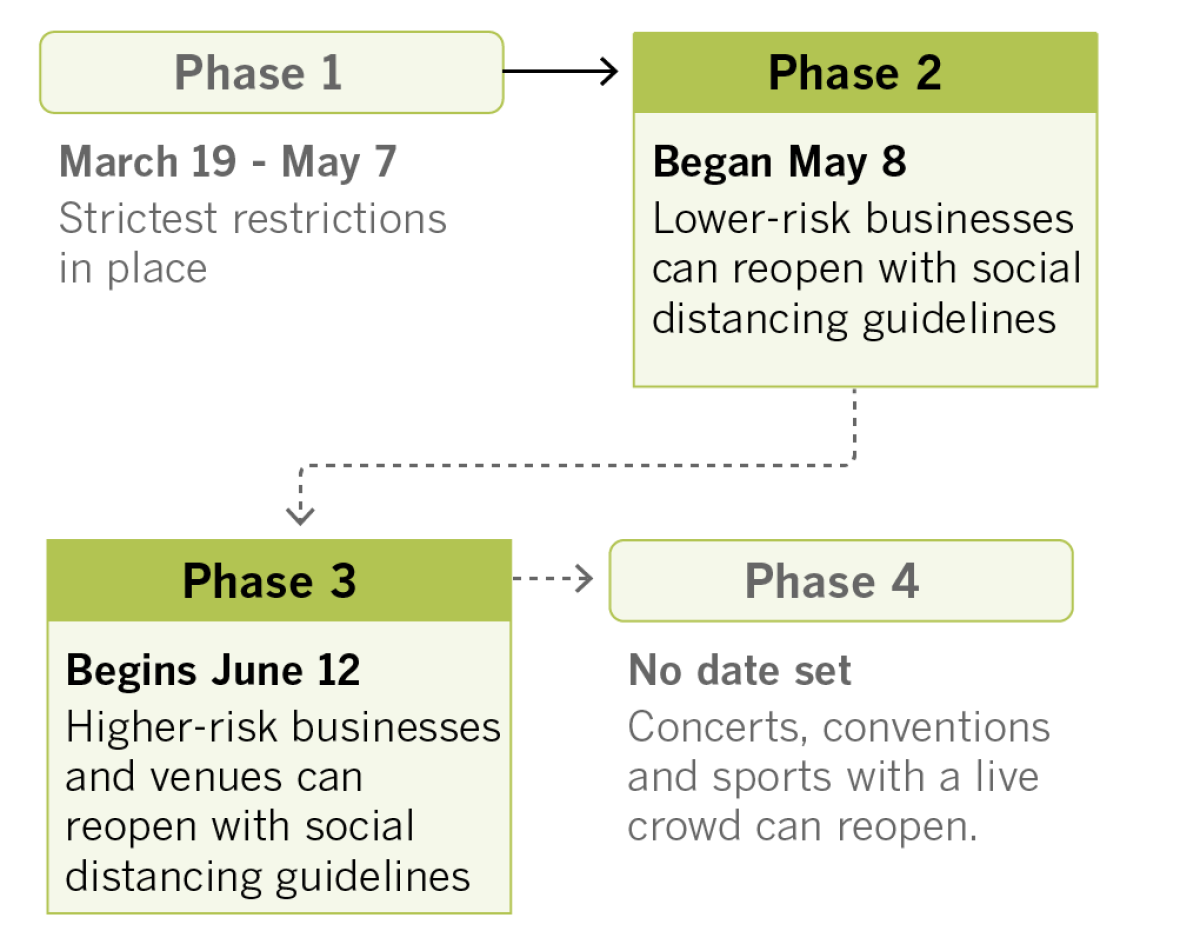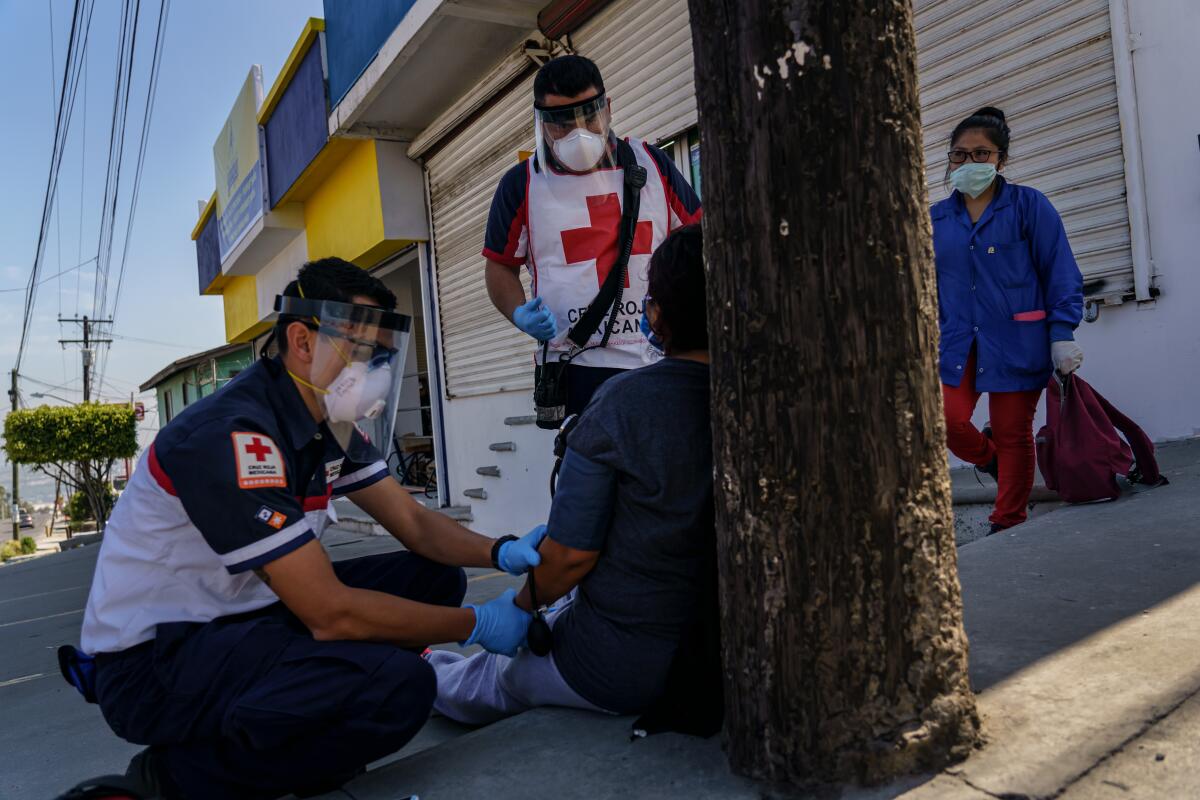Coronavirus Today: A hopeful number for L.A.
Good evening. I’m Diya Chacko, and it’s Thursday, May 21. Here’s what’s happening with the coronavirus in California and beyond.
As the California economy grinds back to life after months of coronavirus closures, one question still looms over the reopening cheers: Do consumers feel safe enough to come back? In Napa County, the first in the Bay Area to restart in-restaurant dining services, customer traffic has been light. “Confidence is something we need to build in the community,” said the owner of a restaurant in downtown Napa. “It will be a slow return.”
At this point, most counties — 40 out of 58 — have been given the green light to move into Phase 2, clearing them to reopen restaurant dining rooms and more retail businesses for in-store shopping, with modifications. The list does not include Los Angeles County, which remains the epicenter of California’s coronavirus activity.
Still, the county reached a new milestone in its effort to slow the spread of the virus: The effective transmission number, or “R,” is now less than one. In other words, every infected person now infects fewer than one other person on average, explained Dr. Christina Ghaly, county director of health services. “If ‘R’ stays under one, then the epidemic in Los Angeles County is expected to decrease over time,” she said.
The accuracy of public coronavirus data is under scrutiny as some states led by Republicans push for faster and wider reopening. Florida Gov. Ron DeSantis is defending his administration’s data reporting after a state Department of Health manager said she was fired for refusing to manipulate COVID-19 numbers “to drum up support for the plan to reopen.” The office of Georgia Gov. Brian Kemp, also a Republican, was forced to apologize for publishing a graph showing new cases declining after the Atlanta Journal-Constitution found major errors.
The Times’ own California coronavirus tracker, linked in every edition of this newsletter, is an independent, continuous survey of California’s 58 counties’ health agencies as well as the three run by cities. In addition, we’re tracking reopening progress and beach closures statewide and the efforts of the city of Los Angeles to house thousands of homeless people.
By the numbers
California cases and deaths as of 4 p.m. PDT Thursday:
Track the latest numbers and how they break down in California with our graphics.

See which counties are reopening with our tracker.
Across California
More than half of California households have lost income due to the pandemic, the U.S. Census Bureau said Wednesday, based on a newly launched weekly survey. The results also found that nationally, more than a fifth of adults surveyed reported they had slight or no confidence in their ability to pay their rent or mortgage in June.
State lawmakers voiced frustrations against the Employment Development Department at a Thursday hearing over its handling of unemployment insurance benefits claims submitted by millions of Californians. “We have never heard the kind of suffering that people are experiencing right now,” Assemblyman David Chiu (D-San Francisco) told EDD director Sharon Hilliard. “When they call your bureaucracy, the feedback we are getting is atrocious, and I believe we can do better.”
In a ray of hope for Hollywood, California next week will roll out new protocols for film production, Gov. Gavin Newsom said, adding that filming could start as soon as Monday in counties that meet testing, hospital capacity and other criteria. L.A. County isn’t there yet; Newsom said production will resume there “a few weeks behind potentially everybody else.” “Contagion” director Steven Soderbergh, who heads a Directors Guild of America committee looking into how filming can resume, says the way to keep crews safe is clear, but the path to ramping up production volume to pre-pandemic levels isn’t. “How long before we can get it back to that level is really a question that we’re all trying to figure out right now.”
Law enforcement officials in Los Angeles and across the country have been overwhelmed in recent months by a surge in tips about online child sex abuse. They say that with schools closed, youth activities canceled and kids spending more time online, sexual predators have ramped up their efforts to solicit pictures and videos. The LAPD’s Internet Crimes Against Children unit received nearly 3,000 tips in April, up from 1,355 in March, according to the unit commander.
Curbside pickup is helping L.A. bookstores handle what demand there is while opening up a path to normalcy. But sales have not yet begun to rebound from their drop of roughly 50% to 70% during the pandemic, several booksellers say, and the partial reopening brings new concerns over how to balance customers’ and employees’ safety and satisfaction. “It’s brutal,” one store owner said.
Resources
— For general safety, wash your hands for at least 20 seconds (here’s a super-fun how-to video). Stop touching your face, and keep your phone clean. Practice social distancing, maintaining a six-foot radius of personal space in public. And wear a mask if you leave home. Here’s how to do it right.
— Watch for symptoms including fever, cough, shortness of breath, chills, repeated shaking with chills, muscle pain, headache, sore throat and loss of taste or smell. If you’re worried you might be infected, call your doctor or urgent care clinic before going.
— Here’s how to care for someone with COVID-19, from monitoring their symptoms to preventing the virus’ spread.
— If your job has been affected by the coronavirus pandemic, here’s how to file for unemployment.
— Here are some free resources for restaurant workers and entertainment industry professionals having trouble making ends meet.
— Advice for helping kids navigate pandemic life includes being honest about uncertainties, acknowledging their feelings and sticking to a routine. Here’s guidance from the Centers for Disease Control and Prevention.
— In need of mental health services? Here are resources for coping during the crisis from the CDC and the L.A. County Department of Public Health. L.A. County residents can also call (800) 854-7771 or text “LA” to 741741.
Around the nation and the world
One day after clashing with its leaders over their plans to expand voting by mail, President Trump visited Michigan on Thursday to tour a factory making ventilators and personal protective equipment. It’s his third trip outside Washington since early March, and like the first two, it’s to a swing state that could be pivotal in November. The Michigan trip, already overshadowed by the absentee ballot fight, took place just as part of the state faced devastating flooding after two dam breaches forced thousands to evacuate. Michigan has also been hit hard by the pandemic; more than 5,000 people have died, and about a third of the workforce has filed for unemployment.
One of the largest mass coronavirus testing sites in Nevada is now open in Las Vegas, thanks to a hefty donation of more than 200,000 test kits from the crown prince of Abu Dhabi, ruler of the United Arab Emirates. Previously, Nevada could test only hundreds, not thousands, of people daily, which posed a roadblock to reopening. The U.A.E. has a financial interest in seeing Vegas come back to life: Dubai’s state investment vehicle owns half of the sprawling CityCenter complex on the Strip.
The coronavirus is killing so many people in Tijuana that the morgue has run out of refrigerator space for bodies. And the Mexican Red Cross is handling the majority of emergency calls for the city of 1.8 million people. These photos are a glimpse into the work of their paramedics as they handle as many as 40 calls a day.

Your questions answered
Today’s question comes from readers who want to know: Is it safe to have repairs done in my house? Reporter Lila Seidman did some research.
Plumbers, electricians and handymen and -women are considered essential workers, coming to the rescue when a pipe bursts or the electricity goes haywire. But does it make sense to call them for more minor repairs, especially when it might put your safety — and theirs — at risk?
Workers are required to wear masks and keep their distance from others inside a home, apartment or commercial space they’re working in, just as people in other essential businesses are, according to public health guidelines. Some companies outfit their workers in additional protective gear, such as gloves and booties. One repair company owner said he typically asks customers to take a walk while work is being done or stay in another room.
If you need repairs to fix a serious issue, such as an electrical short that could spark a fire or a leaky pipe that could cause thousands of dollars of water damage, make the call. It’s necessary to bring in a trained professional before a situation grows dire.
If it’s less urgent, weigh the risks. If you or others in your household are over 65 or have underlying health conditions, you might need to postpone calling in workers for a few weeks. If you must go forward, increase safety precautions such as sanitizing surfaces, wearing masks and keeping your distance as much as possible.
And if you’re thinking about taking on the work yourself, you’re not alone. People are consulting video tutorials, borrowing tools and performing their own home repairs, maintenance and renovation projects. But be careful. “To be honest, I felt like I was in a Marx Brothers skit at almost every pass with it,” said a Koreatown resident who built out her own closet. “It’s not exactly perfect, but it totally works for me.”
Got a question? Our reporters covering the coronavirus outbreak want to hear from you. Email us your questions, and we’ll do our best to answer them. You can find more answers in our Frequently Asked Questions roundup and in our morning briefing.
For the most up-to-date coronavirus coverage from The Times, visit our homepage and our Health section, listen to our “Coronavirus in California” podcast and follow us on Twitter and on Instagram.





